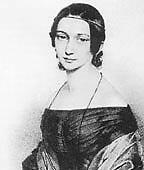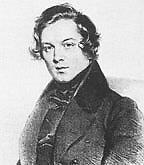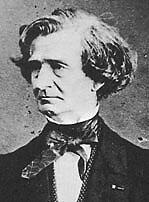If Music Be the Food of Love, Play On...
February 1, 1998
Version française...
Shakespeare called music the food of love, but love has also
nourished countless musical masterpieces, especially among the
Romantic composers of the nineteenth-century. Archetypal Romantic
poet Alfred de Musset wrote an elegy on the premature death at 28 of
the great diva Malibran. Here is the 26th verse of Stances à la
Malibran, freely translated:
- Yes, yes, you realized, and knew that in this life,
- Nothing's as good as to love, as true as to suffer.
- Every night in your songs you felt yourself wane.
- You knew the world, and the people, and desire,
- And, holding in that broken body your genius,
- You also observed La Malibran expiring
-
- .
-
- Clara Wieck and Robert Schumann
 Poets and musicians
have always had the power to crystallize their emotions into
masterpieces. Poets and musicians
have always had the power to crystallize their emotions into
masterpieces. The love story of Clara Wieck and Robert Schumann is one of the
most famous and tragic musical unions in history. Clara Weick was
a brilliant pianist, a child prodigy tutored by her stern father
Friedrich Wieck, a piano professor. Young Robert Schumann came to
live with the Wiecks to take piano lessons and despite Herr
Weick's close surveillance, Clara and Robert fell in love. Herr
Weick discouraged their affection, intercepting and returning the
letters Schumann wrote to his daughter. Robert courted Clara with
musical love letters, sometimes incorporating an acronym of
Clara's name in the notes. Stimulated by love he wrote Carnaval
opus 9, Fantaisie opus 17, the Etudes
symphoniques, Davidsbündlertänze, Kinderscenen
and Kreisleriana. Unimpressed by Schumann's genius,
Clara's father went to court to prevent their marriage, but in
vain. Their marriage initiated a period of great creativity for
Schumann. He set to music more than 30 poems, the most famous of
which are Liederkreis, Myrthen, Frauenliebe und
Leben, and Dichterliebe (using poems by Heine). He also
started the Concerto for piano in A minor and composed the
Symphony No.1 in B flat major ("Spring") in one month, and
he completed two more symphonies before the end of the year. The
happy couple had eight children before Robert was stricken with
madness. Following several suicide attempts, he was confined to a
lunatic asylum where he died. -Agathe de Vaux
The love story of Clara Wieck and Robert Schumann is one of the
most famous and tragic musical unions in history. Clara Weick was
a brilliant pianist, a child prodigy tutored by her stern father
Friedrich Wieck, a piano professor. Young Robert Schumann came to
live with the Wiecks to take piano lessons and despite Herr
Weick's close surveillance, Clara and Robert fell in love. Herr
Weick discouraged their affection, intercepting and returning the
letters Schumann wrote to his daughter. Robert courted Clara with
musical love letters, sometimes incorporating an acronym of
Clara's name in the notes. Stimulated by love he wrote Carnaval
opus 9, Fantaisie opus 17, the Etudes
symphoniques, Davidsbündlertänze, Kinderscenen
and Kreisleriana. Unimpressed by Schumann's genius,
Clara's father went to court to prevent their marriage, but in
vain. Their marriage initiated a period of great creativity for
Schumann. He set to music more than 30 poems, the most famous of
which are Liederkreis, Myrthen, Frauenliebe und
Leben, and Dichterliebe (using poems by Heine). He also
started the Concerto for piano in A minor and composed the
Symphony No.1 in B flat major ("Spring") in one month, and
he completed two more symphonies before the end of the year. The
happy couple had eight children before Robert was stricken with
madness. Following several suicide attempts, he was confined to a
lunatic asylum where he died. -Agathe de Vaux
- Beethoven: The Distant Beloved
At the dawn of the
Romantic era, Beethoven had platonic relationships with several
women. He dedicated his Trios Op. 70 and the Sonata for
cello Op. 102, No.2 to Maria von Erdödy. He had passionately
loved several women: Giulietta Guicciardi, to whom is dedicated
the Moonlight Sonata Op. 27; Joséphine von Brunswick,
dedicatee of the Sonatas Op. 31, and probably Beethoven's
"immortal beloved"; and Theresa Malfatti, the possible muse of
Beethoven's song cycle An die ferne Geliebte (Songs to
the Distant Beloved). -Agathe de Vaux
- Hector Berlioz and Harriet Smithson
 Berlioz was inspired
to compose his Symphonie Fantastique by his unrequited love
for Irish actress Harriet Smithson, celebrated in Paris for her
Shakespearean acting. The violence of his love letters to the
actress frightened her and she did everything in her power to
discourage him. He pressed his case. "If she could perceive but
for one moment the poetry, the infinity, of such a love she would
throw herself in my arms where she would suffocate from my
embrace." Friends of Berlioz' brought Smithson to a concert where
she finally heard the Symphonie Fantastique more than a
year after its composition. She was moved by Berlioz's passion and
flattered that she had been the inspiration for both the
Symphonie Fantastique and Lélio. Smithson married
him a few months later despite the fierce opposition of their
parents. Harriet was, at that time, crippled by an accident and
financially ruined but, as Berlioz exulted, "she was mine . . ."
-Agathe de Vaux Berlioz was inspired
to compose his Symphonie Fantastique by his unrequited love
for Irish actress Harriet Smithson, celebrated in Paris for her
Shakespearean acting. The violence of his love letters to the
actress frightened her and she did everything in her power to
discourage him. He pressed his case. "If she could perceive but
for one moment the poetry, the infinity, of such a love she would
throw herself in my arms where she would suffocate from my
embrace." Friends of Berlioz' brought Smithson to a concert where
she finally heard the Symphonie Fantastique more than a
year after its composition. She was moved by Berlioz's passion and
flattered that she had been the inspiration for both the
Symphonie Fantastique and Lélio. Smithson married
him a few months later despite the fierce opposition of their
parents. Harriet was, at that time, crippled by an accident and
financially ruined but, as Berlioz exulted, "she was mine . . ."
-Agathe de Vaux
- Richard Strauss: Last Songs
- Richard Strauss, a great romantic in every sense of the word,
had offered Morgen and other songs (Op. 27) to his wife as
a wedding present. There has been speculation about a possible
relation with the famous soprano Maria Jeritza. Strauss wrote a
fifth Lied, "Malven", which was not part of his Four Last
Songs (Vier Letzte Lieder) cycle, and dedicated it to
Jeritza. She never sang it in public but kept the manuscript until
her death in 1985, when it was sold at auction in New York. That
year it was sung for the first time in public by Kiri Te Kanawa.
Thanks for these details to Pierre Béique, general manager of the
OSM from 1937 to 1970, who had met Jeritza. -Agathe de Vaux
- Richard Wagner's Wesendoncklieder: A Gift Never
Presented
 On the run from the Prussian
authorities for his involvement in the Dresden revolution, Richard
Wagner was forced into exile in May 1849. After a brief stay in
Paris, he moved to Zurich, where he obtained patronage from a rich
financier named Otto Wesendonck. Wagner grew to admire his
patron's wife, Mathilde, and confessed his ever-increasing passion
in a now famous correspondence. Mathilde Wesendonck had an
artistic personality and was a talented writer. Wagner set five of
Mathilde's poems to music in the Fünf Gedichte für eine
Frauenstimme (Five Poems for a Woman's Voice), also known as
the Wesendoncklieder. Two of these Lieder are subtitled
"Etude for Tristan." Their Schopenhauer-inspired content
foreshadowed the harmonic language of Tristan,
characterized by unresolved tensions. On the run from the Prussian
authorities for his involvement in the Dresden revolution, Richard
Wagner was forced into exile in May 1849. After a brief stay in
Paris, he moved to Zurich, where he obtained patronage from a rich
financier named Otto Wesendonck. Wagner grew to admire his
patron's wife, Mathilde, and confessed his ever-increasing passion
in a now famous correspondence. Mathilde Wesendonck had an
artistic personality and was a talented writer. Wagner set five of
Mathilde's poems to music in the Fünf Gedichte für eine
Frauenstimme (Five Poems for a Woman's Voice), also known as
the Wesendoncklieder. Two of these Lieder are subtitled
"Etude for Tristan." Their Schopenhauer-inspired content
foreshadowed the harmonic language of Tristan,
characterized by unresolved tensions.
- It is not clear
if the passionate letter writers Richard and Mathilde consummated their passion. The
unresolved harmonic tensions in Tristan suggest unrequited
love. We know that during his relationship with Mathilde, Wagner
interrupted his composition of Siegfried to indulge his
obsession for Tristan. Perhaps Wagner, torn between love
for Mathilde and loyalty to his patron Otto, identified with
Tristan, torn between his love for Isolde and loyalty to his
master, King Marke. When Otto discovered one of Wagner's
passionate letters to Mathilde containing the possibly adulterous
passage, "I will come to the garden today, I hope that when I see
you I will find you alone and that we won't be disturbed", Richard
and Mathilde were forced to part.
- The Wesendoncklieder, inspired by Mathilde, paved the
way forTristan . The composer admitted later in his
Diary to Mathilde, "I have never done any better than these
Lieder; extremely rare are those among my other works that compare
favorably." - Jacques Desjardins
- The Gift Of The Siegfried Idyll
- While most of
his operas focus on the volatility of ecstasy and despair found in
the world of human and supernatural passion, Wagner's Siegfried
Idyll was written at a time of great domestic stability in his
life. Siegfried Idyll, for small chamber orchestra, is an
intimate one-movement piece created as a love offering for his
wife Cosima, who had recently borne him a son. Wagner' ode used
several musical themes which he had jotted down years earlier as
they were falling in love. Cosima awoke on her 33rd birthday to
the music of the idyll being played by a small band on the stairs
of their Swiss villa. The peaceful first theme of the Idyll
leads into a hauntingly simple German cradlesong, "Sleep, Little
Child, Sleep". Wagner elaborates and develops the heroic motif
"Siegfried, hope of the world" before winding down with a drowsy
reiteration of the lullaby and opening theme, creating the image
of a hushed beginning to a long, peaceful sleep. Probably the
best-known of his instrumental works, Siegfried Idyll bears
witness to the fact that even an epic genius like Wagner can be
inspired by the emotions and events of domestic life. - Valorie
Dick
-
- "Love arrives without knocking. Love cannot
be explained, yet explains all
. . ." or almost all masterpieces.
- Happy
Valentine's Day!
[Translation:
Saskia Latendresse, Philip Anson]
Version française... |
|


